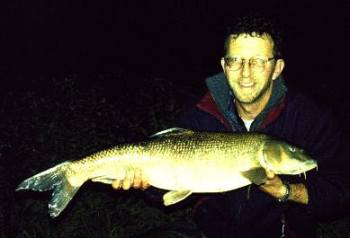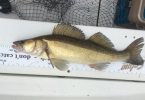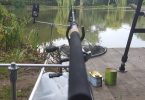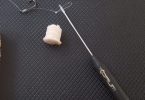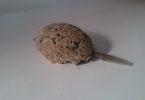I am not very technically minded so what follows are opinions not scientific facts. I first encountered braided lines when a couple of friends started to use braided main lines for Pike fishing. Whilst I could see the advantage for very long range fishing, most of my Pike fishing is river or boat fishing and I much preferred the cushion of nylon when playing fish very close in.
That’s how I felt about Barbel fishing and braid. I love playing fish on through action rods and at the close range that most Barbel fishing is conducted I didn’t want to lose the cushion of nylon. The other deterrent for me was the reportedly unpredictable nature of the stuff. Besides which I would have to learn new knots. I am not comfortable fishing with tackle I do not have confidence in and my attitude was "if it’s not broken don’t fix it".
However, during the 1997/8 season I dropped a number of fish off on the lower Severn during the winter months. The pattern was always the same, a bite, a strike, fish on, clutch buzz, fish falls off. Most of my fishing in the winter is roaming around casting, rolling and trundling large lumps of meat. I might bait one swim on arrival and have the odd twenty minutes with a bait in it but most of the time most of fish I catch in the winter are caught roaming around. Even with eight or ten foot of extra water, the lower Severn has very few areas where a Barbel is not comfortable, even in mid river. By aiming to cover as much water as possible I often fish baits mid- river. This means using three or four ounce leads if there is more than a few feet on but I want to cover as much of the river as possible, and hopefully put a bait near a feeding fish.
I felt sure the problem was that the fish dropping off had simply not been hooked in the first place, a combination of heavy lead, big bow in the line and depth of water. If there is, any amount of rubbish coming down then the problem becomes worse. At times I have had the rod pointing straight down the line before striking and have only just felt the nod of a hooked fish when the rod is high above my head. In other words the strike was merely taking the stretch out of the line and not setting the hook. Hair rigging is one solution but aside from a slight moral reluctance to use them I like to change baits every cast, I move the bait around the swim, and vary the size of offering (one lump or three). I just find it a lot simpler putting baits on the hook and holding the rod than fiddling around with needles etc.
Although I caught a lot fewer fish last winter, the difference between using nylon and braid was amazing. The strike was much more positive and the only fish I dropped off fell off after it came out of a snag. Problem solved I hope!
 One certainly feels a lot more touch legering. With so many bites there was often the minutest preliminary warning, some times a slight relaxing of tension or a tiny knock which could be lost on twenty or thirty yards of stretchy nylon. I always assume the tiniest knock is a Barbel and although I wait for a positive indication before striking, some times small bites are all I get so magnifying any small indications gives me the confidence to strike. If no positive bites occur after say ten minutes of a preliminary enquiry I’ll reel in, move on, and return to the swim an hour or two later. I catch a lot of fish by returning to swims where I’ve had the slightest tremble and striking the next positive pull. You certainly feel more about what the lead is doing and bites are more dramatic on braid but ninety percent of the Barbel I hook give positive bites on nylon or braid. If anything, bites on braid seem snatchier and less confident than on nylon. Maybe because braid lets us feel more, it also allows the fish to feel more.
One certainly feels a lot more touch legering. With so many bites there was often the minutest preliminary warning, some times a slight relaxing of tension or a tiny knock which could be lost on twenty or thirty yards of stretchy nylon. I always assume the tiniest knock is a Barbel and although I wait for a positive indication before striking, some times small bites are all I get so magnifying any small indications gives me the confidence to strike. If no positive bites occur after say ten minutes of a preliminary enquiry I’ll reel in, move on, and return to the swim an hour or two later. I catch a lot of fish by returning to swims where I’ve had the slightest tremble and striking the next positive pull. You certainly feel more about what the lead is doing and bites are more dramatic on braid but ninety percent of the Barbel I hook give positive bites on nylon or braid. If anything, bites on braid seem snatchier and less confident than on nylon. Maybe because braid lets us feel more, it also allows the fish to feel more.
Playing fish on braid is a much more direct experience, although I usually chicken out when the fish is under the rod tip and slacken off the clutch by a couple of notches. Without the cushion of nylon I prefer to play safe when a fish is close in. By and large, I feel happier playing fish on nylon, everything seems under so much tension when using braid. If there is any weak spot in the tackle the lack of give in the line will transmit any additional shock directly to that weak spot. Obviously there shouldn’t be any weak spots but fish snag up, line is dragged across rocks or branches and I think nylon has the advantage of cushioning the stress on such weak spots. I had a nine pounder from a bank-high and rising Bristol Avon, which came to the surface in a ferociously fast glide and held itself in the flow refusing to budge. I could not get downstream of the fish and I couldn’t let it go any further downstream so I just hung on whilst the fish swirled on the surface. There was a tremendous strain on the tackle but eventually I moved the fish into slightly steadier water and she was mine. In that situation I was much happier using nylon. A week later I was on the lower Severn still with nylon on the reel and I hooked another nine pounder in mid-stream, which kited in to a willow, two bushes downstream of where I was. I got the fish through the first willow but she stuck in the upstream bush. I eventually managed to force the net under the bush and around the fish before biting the line and landing her. Having used braid all through the winter on the Severn it felt as if I was playing it on an elastic band and I am sure braid would have given me much greater control over the fish.
Two problems I have had with braid are the line bedding in on the reel and, because of its limpness, its tendency to wrap around tip rings etc. The line bedding in wasn’t a problem on the Severn (you just cast a bit harder) but on smaller rivers where casts with smaller leads have to be that bit more exact, it was such a pain that I have reverted to nylon. This season I have changed to Spider Wire Fusion, which is not strictly a braid but has exactly the same properties without the limpness, and this has all but cured any problems with line wrapping around tip rings etc. One of the claimed advantages of braid is that the reduced diameter allows one to use lighter leads in any given situation. In theory a reduced diameter line creates less resistance to flowing water, hence less lead is needed to hold in a specific spot. But in a practical fishing situation the overriding consideration in winter is how much rubbish is coming down. I can’t see how the diameter of a line can be of any relevance to the amount of rubbish that catches on it.
To sum up, I have found a distinct use for braided mainlines, namely setting the hook in flood conditions on big rivers such as the Severn. One can certainly feel more of what is going on at the terminal end of the tackle but I have found that on smaller rivers I prefer nylon. If I feel that braid will give me an advantage in a particular situation, I will use it, if not then I will change back to nylon for it’s ease of use and forgiving nature. Other anglers may find different advantages with braid for the rivers and fishing they do but for me it is a piece of tackle with specific properties. These can work for me in one situation and against me in a different situation.
JOHN COSTELLO
If you’d like to find out a bit more about The Barbel Catchers Club, please click here.

